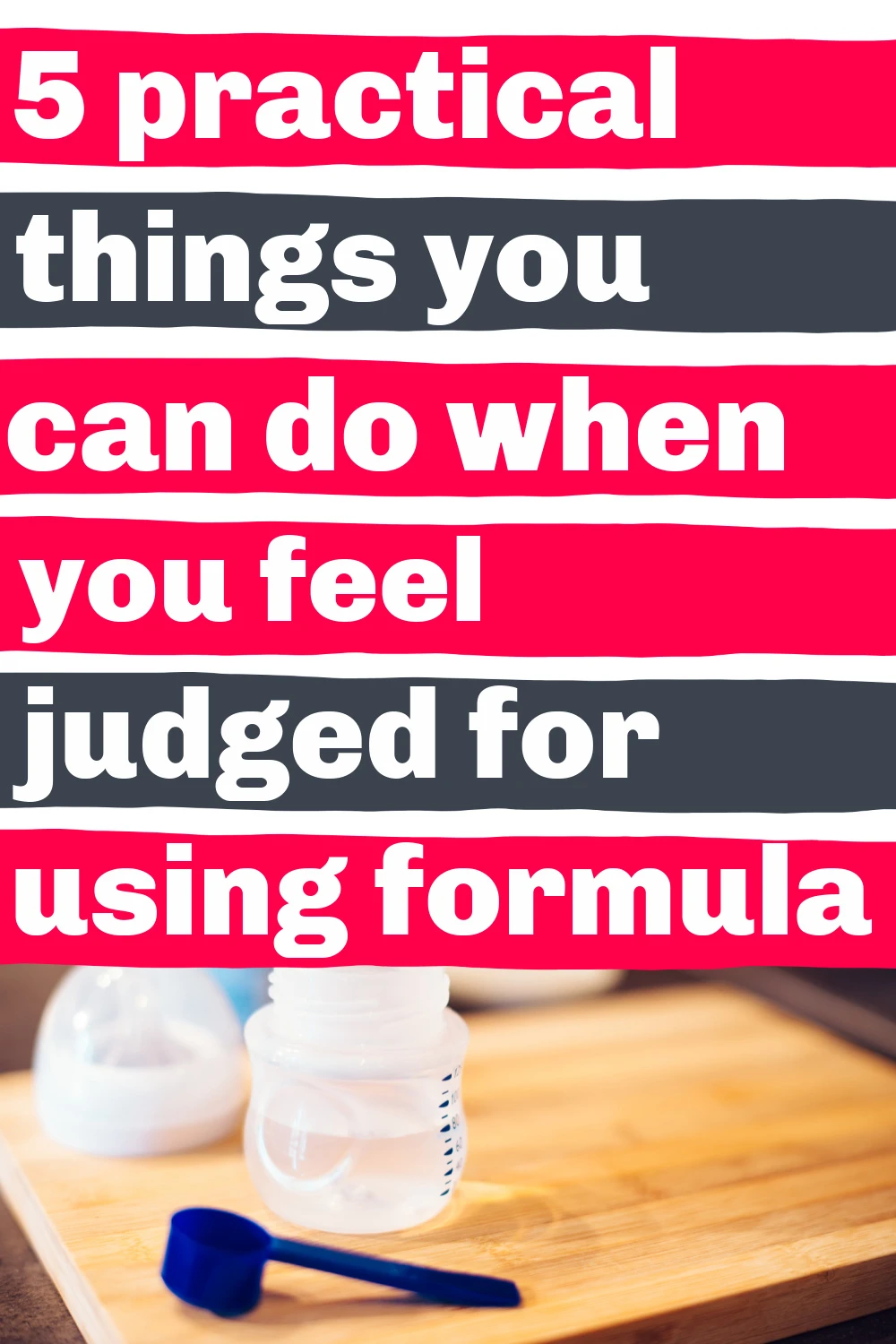Inside: Unfortunately, most bottle feeding moms know what it’s like feeling judged for formula feeding. Here are five practical things you can do to not let the judgy people get to you (even medical professionals), and to increase your parenting confidence, instead.
I sat in the circle of other new moms, surrounded by car seats and diaper bags, my son stretched out on a blanket in front of me. I had been attending this support group for new moms for a couple of weeks, and I’d quickly noticed that I was the only formula-feeding mama there.
As I mixed up a bottle of formula for my son, the woman who happened to be leading the group that day walked over. She introduced herself and told me she was a doula and certified lactation consultant, and then asked if I needed any breastfeeding help.
She listened as I shared about my breastfeeding experience— my poor milk supply, the weeks I had spent with my son crying every time I tried to breastfeed, and his difficulty in gaining enough weight when I tried to exclusively breastfeed.
Instead of offering empathy and understanding, she started giving me tips to “fix” my situation.
She ended the conversation by reminding me that “breast is best” and that I just needed to get back to it and stick with it.
While I’m sure her heart was in the right place, I left that conversation feeling even more guilty than ever about using formula.
Related: Ditch Formula Feeding Guilt for Good with These Five Tips

Formula-Feeding Mamas Encounter Parenting Judgement Strong and Early
THIS POST PROBABLY CONTAINS AFFILIATE LINKS. AS AN AMAZON ASSOCIATE, I EARN FROM QUALIFYING PURCHASES. YOU CAN READ OUR FULL DISCLOSURE POLICY HERE.
Whether it is by choice or because they simply can’t successfully breastfeed (this happens more often than you might think), many moms face judgement about formula feeding every.single.day.
The worst part is it comes not only from friends and family but also from within the medical community.
This can be especially difficult as a new mom – you’re already trying to adjust to motherhood in general and everything that entails.
If you are a new formula-feeding mom and find yourself constantly having to defend or explain your decision to use formula, I want to first give you encouragement: there is absolutely nothing wrong with providing your baby nourishment with formula – NOTHING.
Even if your mother-in-law tries to tell you otherwise, formula-fed babies grow up to be healthy, intelligent, well-adjusted kids, just like their breastfed peers. It is a terrible disservice to moms when they are made to feel guilty about how they are feeding their babies.
The reality is that we will all encounter judgment when it comes to our parenting decisions.
Someone else will always have ideas for a better way of doing things. But how we feed our babies can often be where moms experience this judgment from others for the first time.
Lucky you – you get to learn early how to handle that parenting judgement early.

5 Practical Ways to Handle Feeling Judged for Formula Feeding
Through the experiences I had formula-feeding both of my kids, I learned how to overcome guilt and find the support I needed to be a successful formula-feeding mama. I hope the following ideas will help you during your formula-feeding experience.
1. Find a pediatrician that supports your decision to use formula.
I was lucky that my pediatrician was supportive of both breastfeeding and formula feeding. When it was clear that my son wasn’t getting enough nourishment exclusively breastfeeding, she encouraged me to supplement and reminded me that “fed is best.”
I will admit that I struggled with feelings of failure during those first few months. I just naturally expected for breastfeeding to work.
But knowing my pediatrician had my back and supported me completely was very important.
If you have a pediatrician that isn’t supportive of formula-feeding, I highly recommend you find a new one. That might seem drastic, but you don’t want to feel judgement at every single appointment, especially as there are so many of them in those first few months.
You also want – and need – a pediatrician who is knowledgeable about formula feeding and is willing to guide you along.
2. Find a supportive group of formula feeding moms.
Finding a group of experienced formula feeding mamas can be super helpful. They can offer you advice about bottles, nipples, formula, travel tips, etc.
And beyond the practical advice, they can offer you emotional support as well, since at one point or another, they’ve probably felt judged for formula feeding, too.
If you can’t find a local group, search out groups on social media. I have found some of the best supportive moms groups through Facebook.
Having the support from other formula feeding moms was HUGE for me.
Even if you can only find ONE other mom in your community you can share this journey with, that one mom can make a huge difference. It’s worth it to keep trying!
3. Focus on the many benefits of formula feeding.
When I had to stop breastfeeding, I felt like I was missing out on a really important experience. And honestly, it was a little depressing.
But then I shifted my mindset, and I was able to appreciate all of the benefits of formula feeding.
My husband was able to offer more help at night and I wasn’t so sleep deprived. I could leave the house and not have to worry about getting back by a certain time. I didn’t have to drag my pump to work anymore.
And probably most important of all, my stress levels went WAY down knowing that my baby was getting adequate nutrition.
It can be hard emotionally if your heart was set on breastfeeding and things didn’t go the way you wanted them to. Focusing on the positive aspects of formula feeding can help you process those emotions and move forward.
4. Be prepared for the inevitable questions with prewritten responses.
I can almost guarantee you will be asked why you aren’t breastfeeding—by medical professionals, by nosy neighbors, by well-meaning friends and family.
Although “None of your dang business!” is a totally legitimate response, it is good to have a few other responses in your back pocket as well. Here are just a few. . .
“Breastfeeding is a great option, but using formula works really well for me and my baby.”
“Breastfeeding didn’t work out for us. I’m thankful that formula feeding is going so well and that my baby is thriving.”
“I felt that I would be more successful with formula feeding.”
You also will probably get some unsolicited advice about ways to “fix” any breastfeeding challenges you have had. You can respond with:
“I’m so glad breastfeeding worked well for you, but formula feeding is working much better for us.”
5. If you decide to use formula from the beginning, provide that information in your birth plan.
Many labor and delivery units encourage exclusive breastfeeding while in the hospital. With both of my kids, a lactation consultant was in my room offering assistance on the same day of delivery.
No one asked what my feeding plan was, the staff just assumed I wanted to breastfeed. From talking with other friends, this seems to be a fairly common experience. It’s amazing how much things have shifted in the past fifty years!
When my second son was born, he had to be in the hospital for 10 days. I was hoping to not have supply issues the second time around, but that wasn’t the case.
When it was pretty clear my son was not getting enough from breastfeeding alone, I asked if there was formula I could supplement with, or if I needed to have my husband purchase some.
The nurse discouraged me from using formula, even for supplementing. But as a mom who had already been through this once before, I knew what my baby needed, so I persisted.
If you are a new mama choosing to formula feed from the start, I would highly recommend including this decision in your birth plan.
That way, everyone who cares for you is on the same page from the start, and you might be able to avoid some awkward conversations.
You still might encounter some medical staff that will insist you at least try to breastfeed, but remember that choice belongs to YOU and you alone.
And that leads me to my final tip…
Bonus: Adopt this mantra – I get to decide what is best for me and my family. Period.
While well meaning people in your life (and complete strangers) will try to offer unsolicited advice throughout the child-rearing years, there is no rule saying you have to take it!
Do they have to live with your decisions? Heck no. You do.
Stick to your decisions, and do what is best for your family. Period.

Don’t Let Formula Feeding Judgement Get to You
Whether you choose to use formula from the get-go or if breastfeeding didn’t work for you, just remember—formula IS a wonderful feeding option. It’s a life-saving option, in fact.
Formula provides what your baby needs to thrive and grow when you cannot – or choose not to – breastfeed.
There is truly NO need to feel guilty about being a formula-feeding mama. Formula feeding judgement is just that – judgement, and only YOU can decide NOT to let that judgement get to you.
Learn how to let the judgement roll off your back and build a strong support system that affirms your parenting decisions now, and you’ll most likely look back on formula feeding judgement as a blessing.
Because those skills will put you light years ahead in today’s parenting game, where judgement is, unfortunately, par for the course.
Related: 12 Legitimate Reasons to Stop Breastfeeding – Completely Guilt-Free

Mary Ann Blair is a stay-at-home mom living in the Pacific Northwest with her two little gentlemen and hubs. She loves connecting with other parents who like to keep it real!
Her writing has been published on Her View From Home, Perfection Pending, That’s Inappropriate, Pregnant Chicken, Sammiches and Psych Meds, Red Tricycle and in Chicken Soup For the Soul. She can be found at https://www.maryannblair.com